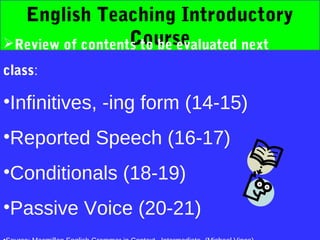
English Teaching Course Review
- 1. English Teaching Introductory Course Review of contents to be evaluated next class: •Infinitives, -ing form (14-15) •Reported Speech (16-17) •Conditionals (18-19) •Passive Voice (20-21)
- 2. Units Nº 14-15 Units Nº 16-17 Units Nº 18-19 Units Nº 20-21 Infin -ing forms Reported Speech Conditionals Passive Voice 5 500 500 500 500 500 500 500 500 4 400 400 400 400 400 400 400 400 3 300 300 300 300 300 300 300 300 2 200 200 200 200 200 200 200 200 1 100 100 100 100 100 100 100 100
- 3. UNITS Nº14-15: To- infinitives/bare infinitives/-ing form • Explain the rule and the difference between them. I remember locking the door. Please remember to write to me • Formulate sentences following these structures. Adjective + to-infinitive Verb+ object+ to-infinitive Verb + bare or to-infinitive
- 4. UNITS Nº14-15: To- infinitives/bare infinitives/-ing form • Choose the correct option and give another similar example using any of the following expressions (it’s good, it’s no use) The film is well worth… to see/seeing • Explain theory When do we use “come” and “go” + -ing? • Formulate sentences using these structures -ing form as subject -preposition + -ing
- 5. UNITS Nº14-15: To- infinitives/bare infinitives/-ing form • Choose the correct option and explain the rule 1-I started…to watch/watching television. 2- I’ll never forget… seeing/ to see you there.
- 6. Units Nº 14-15 To- infinitives/bare infinitives/-ing form • Choose the correct option Don’t let me…. (to down/ down) • Explain the rule for these verbs. Decide, expect, hope, promise, threaten, warm
- 7. UNITS Nº14-15: To- infinitives/bare infinitives/-ing form • Choose the correct option 1-I haven’t finished… to read/ reading the newspaper. 2-John spent a lot of time… doing/ to do his homework. 3- I like… to get up/ getting up early.
- 8. Units Nº 16-17 Reported Speech • Report this sentence. Explain the difference between Direct and Reported Speech. What changes did you make? “I’ll see you tomorrow” • Explain the difference between these two reporting verbs • Give two examples SAY-TELL
- 9. UNITS Nº16-17: Reported Speech • Report these sentences. Mention the tense changes you did. What happens if the reporting verb in in the past ? •Mark said, “I’m looking for a new job” •Erica said, “Sam arrived at five” •Bill said, “I wasn’t listening” •Paul said, “I’ve never ridden a horse”
- 10. Units Nº 16-17 Reported Speech • Report these two questions. •“Where are you going”he asked me. •“Did you post the letter?” she asked him. • Choose the correct answers and give examples of a reported request and command. • To report requests we use ask/tell, and to report commands we use tell/ask.
- 11. Units Nº 16-17 Reported Speech • In the following examples there have been no tense changes. Explain why. 1. 'I still don 't believe you.' He said that he still doesn't believe me. 2. “I’ll be back later” Helen says she'll be back later. 3. “I was playing football when I received the phone call” He said that he was playing football when he received the phone call.
- 12. Units Nº 16-17 Reported Speech • Explain the purpose of changing the verb. • Give an example using the verb “offer” “I won’t sit down” “He refused to sit down”
- 13. UNITS Nº18-19: Conditionals • When do we use “zero conditional?” • Complete the structure and give an example Present Simple +.......... Example:.......................
- 14. UNITS Nº18-19: Conditionals • When do we use “conditional 1?” • Complete the structure and give 3 examples Structure: ............... Example (unless)........ Example (in case) Example (provided that/as long as)
- 15. UNITS Nº18-19: Conditionals • When do we use “conditional 2?” • Complete the structure and give 2 examples Structure:........+............ Example:.............. Example: If I were you.......
- 16. UNITS Nº18-19: Conditionals • Give 4 examples and explain their uses. •Examples with wish (present, past, would, if only)
- 17. UNITS Nº18-19: Conditionals • When do we use “conditional 3?” • Complete the structure and give 1 example •Structure.........+............ •Example:.......................
- 18. UNITS Nº20-21: Passive Voice • When do we use “causative have?” • Follow this structure and give examples have + object + past participle •present simple •present continuous •past simple •present perfect •going to future....
- 19. UNITS Nº20-21: Passive Voice • We use these reporting verbs for reports about the present. Follow this structure and give 3 examples. Present simple passive+ to do / to be doing believe, expect, know, report, say, think, suppose, understand
- 20. UNITS Nº20-21: Passive Voice • These verbs can be followed by two objects. Choose 2 of them and give examples. •buy, give, lend, make something for someone, •offer, prepare something for someone, •promise, sef/, send, take something to someone
- 21. UNITS Nº20-21: Passive Voice • We use this structure in three different situations. Explain and give examples. Get something done
- 22. UNITS Nº20-21: Passive Voice • When do we use Passive Voice? Explain and take into account “transitive and intransitive verbs” • How do we build a Passive Sentence? Give 2 examples with the following tenses: •present continuous passive •present perfect passive